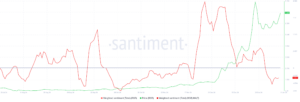Renowned advocacy organization Consumers’ Research raised concerns about Tether, criticizing the USDT stablecoin issuer for exposing users to significant risks due to its business model.
Despite these concerns, Tether has recently emerged as one of the most profitable crypto companies globally, reporting massive quarterly profits.
Consumers’ Research Slams Tether for Audit Risks
In a letter aimed at protecting consumers, addressed to Washington Governor Jay Inslee, Consumers’ Research criticized Tether for failing to conduct an audit to prove that its USDT stablecoin is backed 1:1 by the US dollar, despite promises dating back nearly 10 years.
The report described this failure as a serious risk, calling Tether and USDT a “disaster for consumers waiting to happen.”
“Tether’s continual failure to undergo an independent audit raises a distressing red flag for the company and its USDT product. Tether has promised that it would conduct a full audit since at least 2017 but has still failed to do so. In August 2022, its CEO stated that an audit was ‘likely months away.’ Years later, there is still no audit,” read a paragraph in the letter.
In addition to the lack of audits, Consumers’ Research criticized Tether for its history of doing business with bad actors, including sanctioned crypto exchanges like Garantex and BitPapa. The report also referenced a recent Wall Street Journal (WSJ) article, which accused Tether of “enabling a parallel economy that operates beyond the reach of US law enforcement.”
Read more: 9 Best Crypto Wallets to Store Tether (USDT)
The Consumers’ Research also detailed Tether’s “history of false claims,” mentioning key red flags, including but not limited to:
- In 2018, the US Department of Justice investigated Tether and Bitfinex’s involvement in crypto market manipulation.
- In 2019, New York determined that Tether moved hundreds of millions of dollars to conceal the loss of $850 million in client money.
- In 2021, Tether ceased trading activity in New York and paid $18.5 million in penalties.
- In 2022, Tether settled charges stemming from false statements allegedly made regarding its backing of USDT with US dollars with the Commodity Futures Trading Commission (CFTC).
- Also, in 2022, the SEC fined the law firm that claimed the US dollar-backed USDT for improper accounting purposes.
These reports, which raise concerns about Tether’s financial safeguards, accuse the firm of undermining America’s efforts to fight illicit entities.
“Tether has many of the same issues that FTX and Celsius had before their collapse – potentially costing consumers billions of dollars using deceptive and misleading marketing tactics that are inconsistent with the truth,” the report concluded.
Amidst these claims, it is worth mentioning that Tether is collaborating with Tron and TRM Labs to combat USDT criminal activity.
Tether Relies on Attestations for its Reserves
Tether CEO Paolo Ardoino stated in an April interview that the company relies on attestations for its reserves. He also revealed that Tether is seeking an auditor from among the top global accounting firms. However, the Big Four — Deloitte, PwC, EY, and KPMG — are reportedly hesitant, fearing potential damage to their reputations.
“So you are a Big Four auditing firm, and you have the entire banking industry that is your customer. Why would you risk 100,000 customers for a couple of stablecoins? Between the FTX disaster and the hacks, heists, and regulatory crackdowns in crypto, it hasn’t been easy to sign on as a client for one of those top accounting outfits,” Ardoino said.
Despite these concerns, Tether remains highly profitable. A recent report revealed that Tether outperformed BlackRock, with earnings of $6.2 billion compared to the asset manager’s $5.5 billion.
“How is it possible that a stablecoin issuer with around 100 employees made more money than the largest mutual fund company in 2023? You give them dollars. They give you Tether tokens, which are essentially entries on the blockchain. They use your dollars to buy US bonds yielding 5%. They use the yield to buy Bitcoin for their balance sheet. You do not need many people to do this, and it is an extremely profitable business model. Now you understand why BlackRock has taken an interest in crypto,” crypto analyst Frederik Lund explained.
Read more: A Guide to the Best Stablecoins in 2024
Indeed, Tether’s profits are bolstered by income from US Treasuries and mark-to-market gains on its Bitcoin and gold holdings, according to a recent blog post, which suggests these factors inflate the company’s financials. A quarterly attestation showed $118.44 billion backing Tether-related stablecoins — over $5 billion more than the circulating supply — indicating the stablecoins are fully backed by reserves.
In a recent legal victory, a UK court ruled that Tether’s USDT stablecoin qualifies as property. This decision, made by the High Court Justice for England and Wales, follows the UK Parliament’s move to recognize crypto, NFTs, and carbon credits as personal property under British law.
The post Consumers’ Research Exposes Tether Audit Red Flags appeared first on BeInCrypto.




